A recently-released documentary film on ostomy throws light on medical conditions which require survivors to wear a colostomy bag
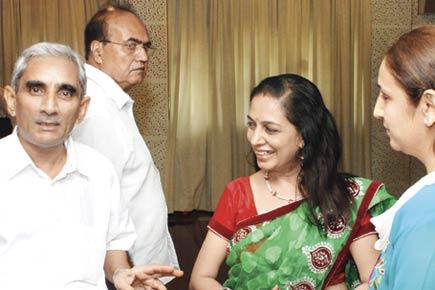
On Monday, at Tata Memorial Hospital’s Chokshi auditorium in Parel, more than 500 ostomates gathered to watch a documentary film by renowned documentary filmmaker, Dinkar Chowdhary.
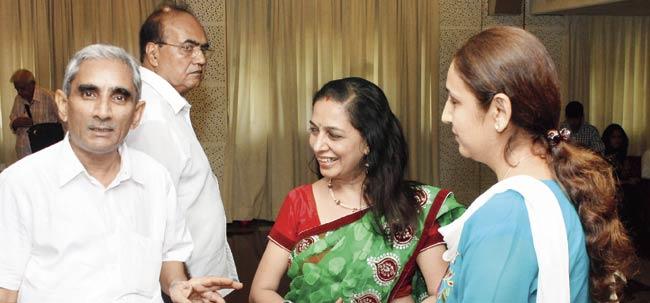
Dr Harikesh G Buch (L), Suja Johnson (C) both ostomates, have a light-hearted discussion
ADVERTISEMENT
An ostomate is a person who has undergone surgery to remove the intestines or urinary tract, thereby having an opening called a stoma to discharge bodily waste. There is loss of control over the bladder or bowels and an ostomate needs a bag to collect the waste known as a colostomy bag.
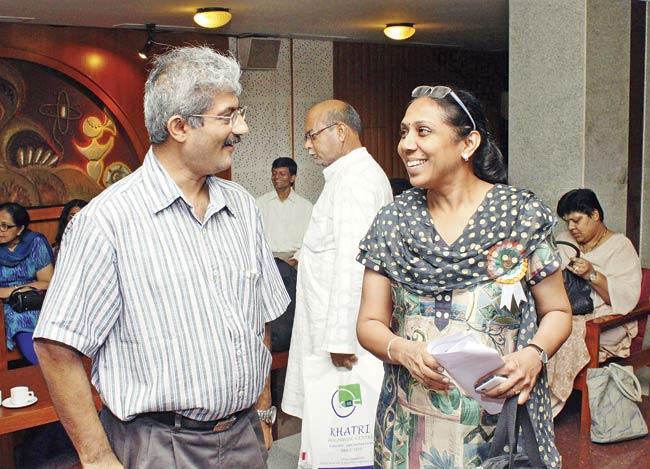
Minal Kothari (R) talks to Ostomy Association of India founding member Ramakant Shah’s son
What makes Chowdhary’s film Ostomate different is that he is also a survivor of the condition. The 30 minute film features many Ostomy Association of India (OAI) members speaking about life as an ostomate. This is the first film ever to be made on the subject in the world claimed OAI secretary Shekar Thakur.
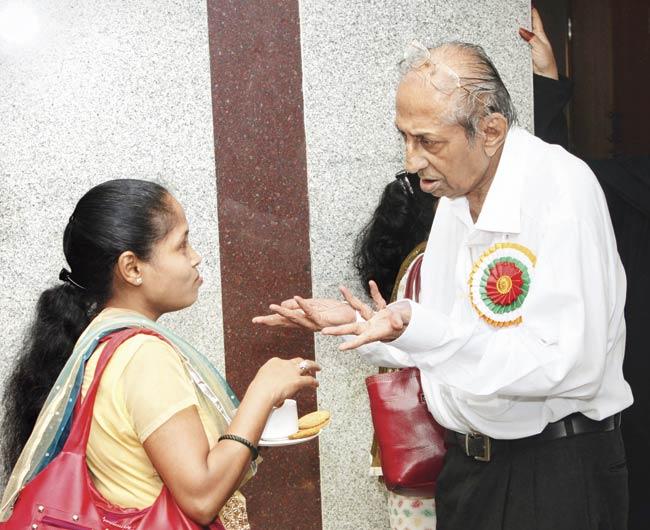 Madhu Patel (R) talks to a fellow ostomate
Madhu Patel (R) talks to a fellow ostomate
Birth of an association
“In 1975, Hiralal Narag, Ramakant Shah and several Tata Memorial Hospital doctors started the OAI under the Indian Cancer Society with just 10 members. The thought that ostomy is a unique issue lead to the formation of the association.
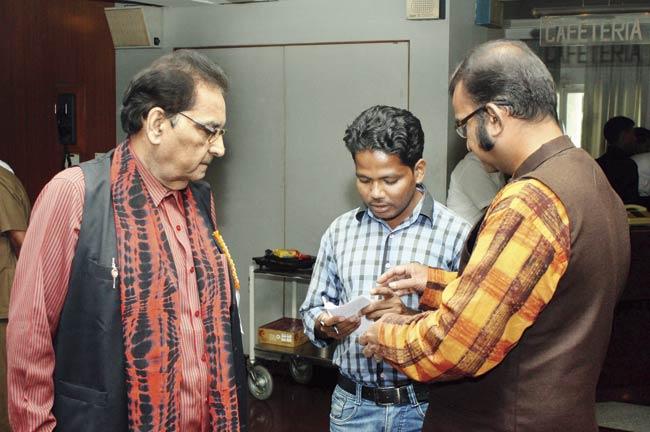
Dinkar Chowdhary (L) talks to co-director Ashish Chowdhary
Plus, the mental and financial well being of ostomates was a concern. Slowly and steadily, the association grew with more and more ostomates joining,” explains 77-year-old Madhu Patel, a Bombay High Court advocate who is also an ostomate.
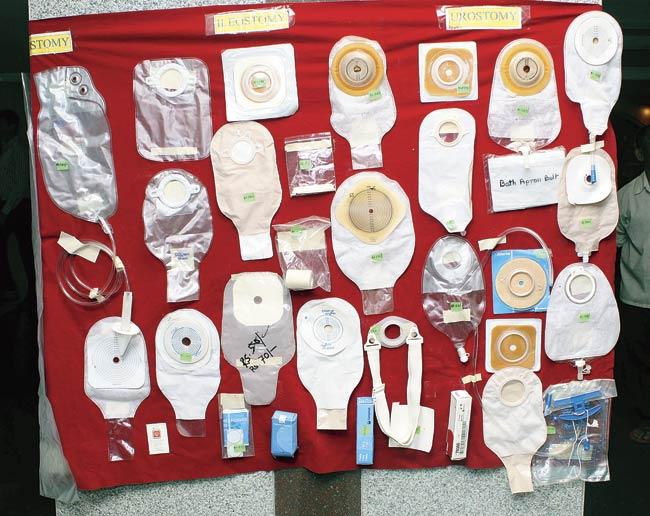
The various colostomy bags available are all exhibited outside the Chokshi auditorium. Pics/Nikesh Gurav
Patel was diagnosed with cancer 10 years ago and has been living with an ostomy pouching system or colostomy bag since 2004. As the chairman of OAI, Patel explains the working of the association. He says, “There are three kinds of conditions along with which ostomy are associated colostomies, ileostomies, and urostomies (see box).
Accordingly, the bags have to be used. The cost of each bag varies from Rs 50 to Rs 300. Every week, for sanitary reasons, the bags have to be changed; then if there is leakage you need to change the bag as and when that happens. So on the whole a person has to spend Rs 2,000-3,000 per month on the bag.” The OAI provides financial aid, free bags as well as counselling to ostomates.
Bhagwan Patel, a 68-year-old ostomate says, “OAI members are like family to me. I can come here and share my problems openly with everyone. If I have a problem, sometimes I find it easier to talk to people from the association rather than my family.”
Helping hands
The OAI currently has more than 15,000 members across India and also some from Nepal, Sri Lanka and Bangladesh, too. “There are a number of bags available at chemists across the country.
The association also gives bags at subsidised rates to members. There are imported as well as Indian bags that are available and according to one’s needs they can choose which one is best suited to them," says Shekar Thakur.
The OAI provides psychological counselling to survivors and helps them realise that being an ostomate, staying cancer-free is priority. Patel shares the experience of a 29-year-old woman who is an ostomate. He says, “The young woman was very depressed as she found it difficult to move around with the bag.
She said her friends would complain of smell, plus there was leakage and she was very worried about not finding a life partner. I made her meet some of the women from the association who have a healthy sex life and also have had children post-ostomy. There is no problem with conceiving or having a healthy sex life post-ostomy. She is slowly learning to accept her condition and is given hope by the other members.”
Thakur adds, “A number of doctors and nurses from Tata Memorial Hospital are also involved with us to help the patients. They provide medical advice and help. All OAI committee members are counsellors providing mental support to patients.”
Dr Harikesh G Buch, a cancer surgeon who is also an ostomate says, “There are certain foods which people cannot eat, as they have to avoid foodstuff that will upset their stomach. For the first few days it is difficult to accept; but once one is mentally accepting of ostomy, life becomes easier. I always feel that we, as doctors only stress on getting the cancer out, but our real job is to rehabilitate patients.”
Survivor’s tales
“In my case, I know how difficult it was to accept my situation. But I was given the best rehabilitation and that helped me not just accept, but also to speak to others about ostomy and how it saves your life. Plus, I always try to make time to speak to and give courage to fellow ostomates.
I have been an ostomate for 38 years and seen that the physical disfigurement that comes with cancer heals fast, but the psychological hurdles are tough to overcome,” explains Dr Buch. Mira Road resident Suja Johnson, who works in a bank, has been an ostomate for 18 years.
She says, “After I delivered my twin sons, I underwent ostomy. I have accepted my condition and lead a normal life. Being an ostomate has taught me patience and endurance. I keep busy and live life to the fullest.”
“Ostomy makes patients lose control on their ability to defecate and for some reason there is a lot of shame associated with the loss. I lead a normal life but mentally, I needed a lot of willpower to get over my depression and ‘why me’ syndrome. Once, I was over that life was normal again for me,” says Dr Buch.
OAI member Minal Kothari, who has been an ostomate for 22 years says, “As a woman, initially accepting the condition was tough. But by becoming part of the association, I was able to cope better. My family also has been very supportive.
Young women who are ostomates, can’t wear tight clothes as the fecal matter may spill, they do get upset. When we counsel them, we make them realise that true beauty is deeper and you don’t need to wear tight clothes to look nice.”
“When I was first diagnosed with cancer, I said my life is over. But with help from my family and the doctors, I agreed to have a stoma made. As I pondered about life, I was inspired to make a documentary on ostomy. Not many people know about the condition and many people are afraid to admit that they are ostomates due to social reasons,” explains Dinkar Chowdhary.
Sanitation issues
“We have to always carry a spare bag in case the one we are using gets damaged. Also, we need washrooms with water or toilet paper as well as soap. In India, not having well-equipped washrooms is a big hindrance for us. I often go back home from Fountain to Pedder Road just to use the toilet,” says Patel.
Pashuram Pingle, 70, says, “As an ostomate, I have no issue using an Indian toilet, but very often there is no water, toilets are dirty and smell which makes it very difficult to answer nature’s call. We need to take care that the bag doesn’t rip and also that nothing leaks when we defecate or pass urine. If the washroom isn’t good then it becomes a big problem.”
“The OAI is working to ensure that public toilets are clean and suitable for ostomates to use without fear of infection and other hygiene problems. We have written letters to the central government with regards to this. Our primary aim though is to psychologically and financially help ostomates accept their condition and face life with confidence,” ends Patel.
OAI Contact details
Phone: 022-24128087;
Email: ostomyindia@gmail.com;
Address: Indian Cancer Society Building, Ground Floor, Jerbai Wadia Road, Bhoiwada, Parel, Mumbai 400012.
 Subscribe today by clicking the link and stay updated with the latest news!" Click here!
Subscribe today by clicking the link and stay updated with the latest news!" Click here!







